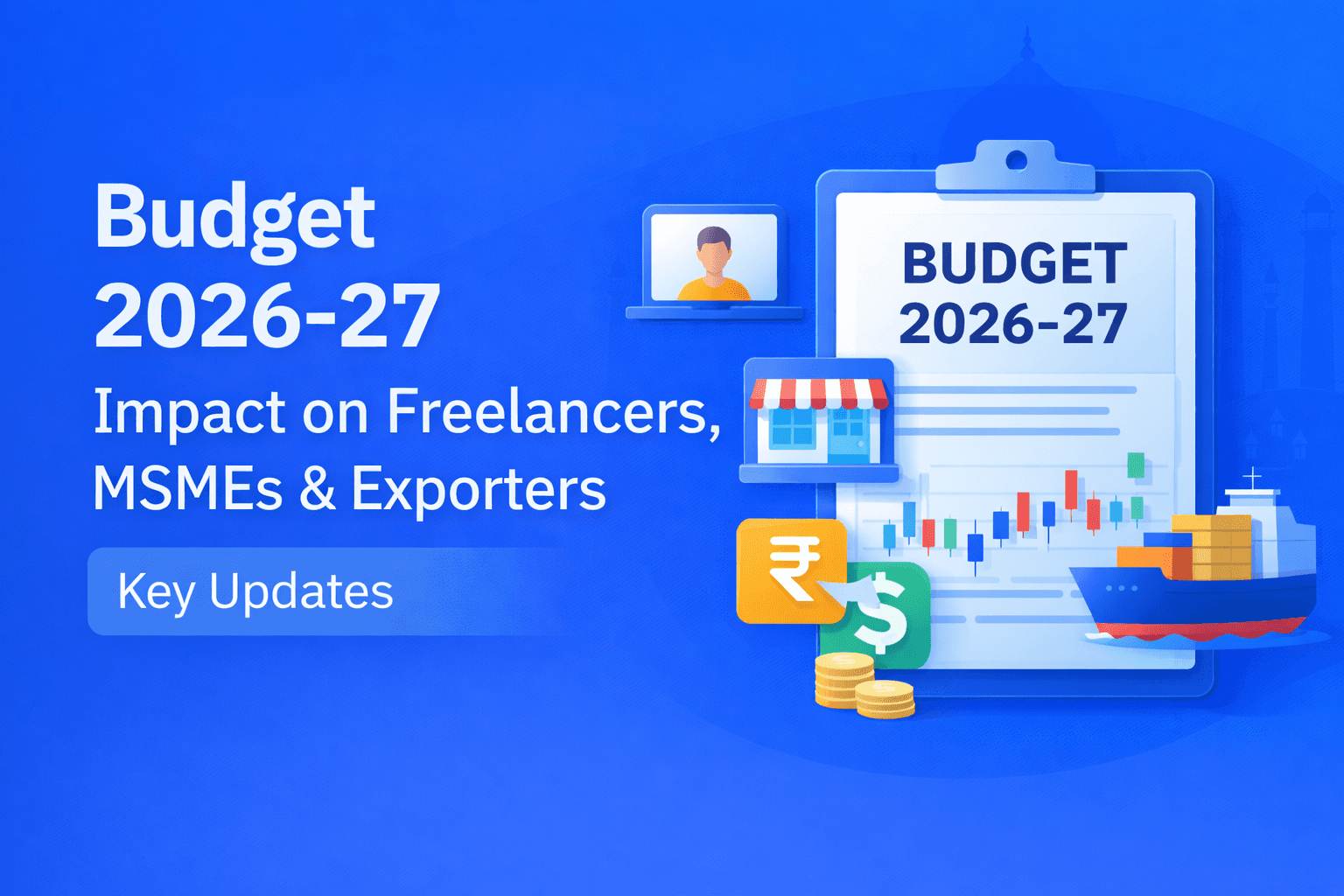Global payments
Posted on May 8, 2025
Subscribe to our newsletter
Get the latest updates, insights, and tips delivered straight to your inbox.
Talk to an Expert
Getting paid from abroad? Whether you're a freelancer, startup, or full-fledged exporter, receiving foreign funds into your Indian bank account means following a few essential rules—RBI purpose codes being one.
These codes aren't just red tape. They tell the Reserve Bank of India why the money's coming in. Is it for software services? Export of goods? Royalty payments? Each reason has a specific code. Pick the wrong one, and your payment could get delayed or flagged.
Choosing the correct purpose code for freelancers and exporters ensures smooth, legal transactions. It also keeps your bank paperwork in order and helps with tax filings later.
The bottom line? Knowing your RBI purpose code isn't optional regarding inward remittance—it's smart business. In this post, we will discuss the RBI Purpose Codes for Inward Remittance. Let's start.
What are RBI Purpose Codes for Inward Remittance?
If you've ever received money from a client overseas, your bank may have asked you to select a purpose code before the funds were credited. Does this sound technical? It's pretty straightforward once you understand what these codes do.
Purpose codes are unique alphanumeric identifiers the Reserve Bank of India (RBI) assigns. They explain the reason behind a foreign transaction, such as whether the money is for freelance services, software exports, or business consulting. Every international payment in India must be tagged with the correct purpose code to comply with government regulations.
So why is this necessary? It is all about regulatory compliance. The codes are used by the RBI and Indian tax authorities to track foreign currency inflows into the country. They ensure that all cross-border payments are recorded, legally categorised, and reported for tax. Without the right code, the payment might be delayed, challenged, or even refused by the bank.
But there is more than just compliance. These codes also make financial reporting easier for the banks, businesses, and the RBI. By identifying transactions by purpose codes, the government can monitor where foreign funds are coming from and why. It also makes it easier for banks to organise their internal processes and for you to get paid without friction.
For Indian freelancers, consultants, or exporters, the decision about which code to pick is not just ticking a box. It will affect how your income is reported and potentially how you file your taxes later. Entering the incorrect code could result in confusion or your money being held in limbo. Hence, the next time you receive a global payment, opt for the perfect RBI purpose code. It will keep your business compliant, your bank happy, and your money flowing smoothly.
Understanding Key Purpose Codes for Inward Remittance
Getting paid from international clients feels great—until the bank asks for a purpose code, and you're left guessing. Let's clear the confusion by walking through some of the most common RBI purpose codes used by Indian freelancers and businesses.
Common RBI Purpose Codes
Here's a table of key RBI purpose codes that you may need when receiving inward remittances:

Real-Life Use Cases: Picking the Right Code
Let's check some examples that will help you understand how the RBI Purpose Code works and which to select when:
Freelance Web Developer
Ravi, a solo web developer in Bengaluru, receives monthly payments from clients in the US. Since he offers software-related services, he uses P0802—Software Implementation Services. This ensures his bank processes the payment quickly and accurately.
Digital Marketing Consultant
Neha runs a boutique agency that offers branding and SEO for overseas startups. Depending on the scope of work, she selects P0806—Advertising and Market Research or P0805—Business and Management Consultancy for all incoming client payments.
Agri-Tech Exporter
Anand's company exports organic fertilizers and agri-tools. Since these involve physical products, he uses P1301—Export of Goods, ensuring all export proceeds are correctly classified and eligible for benefits under the Foreign Trade Policy.
Legal Freelancer
Meera, a freelance legal consultant working with European firms, uses P1015 – Legal Services for all her invoice payments. It also helps her keep income documentation aligned during tax season.
Small NGO Receiving Foreign Aid
For NGOs or charitable trusts receiving funds from international donors, the most appropriate code is P1403—Personal Donations/Grants Received.
Why These Codes Matter?
Choosing the correct purpose code not only helps avoid payment delays but also keeps your business compliant with RBI rules. It ensures your income is correctly tagged, reported, and documented, so you're not left chasing clarifications during audits or tax filings.
How to Choose the Right Purpose Code for Your Payment
When money comes in from abroad, banks need to know why. That's where RBI purpose codes come in. Choosing the correct one can feel confusing—but it doesn't have to be. Here is how you can do it:
Step-by-Step: Picking the Right Purpose Code
1. Understand the Nature of Your Service or Product
Before making any code choices, ensure you are absolutely clear on what you offer. Are you offering software development services? Marketing advice? Exporting goods? The code must represent the real service or product associated with the payment.
2. Refer to the RBI's Official List
You can check the updated list of RBI purpose codes on your bank's website or the RBI's official documents. Most banks also display common codes on their remittance forms.
3. Match the Code to Your Invoice Description
Look at what you've mentioned in your invoice. If the description says "Content Creation Services," the code should align with creative or advertising services—not general consulting.
4. Confirm with Your Bank (If Unsure)
Still confused? Call your bank. Most international remittance desks can help you pick the right code based on your business activity.
Consequences of Incorrect Purpose Code Selection
Choosing the wrong RBI purpose code may seem like a small mistake. But it can lead to bigger issues. These include the following:
Delays in Remittance
One of the most immediate consequences is payment delays. If the purpose code doesn't match the nature of the transaction, your bank may hold the funds for clarification. This back-and-forth can stretch for days, especially if compliance teams step in. Some payments may even be reversed if the bank suspects regulatory non-compliance.
Freelancers and businesses depending on timely payments can face cash flow problems, late invoice penalties, or strained client relationships—all because of a code mismatch.
Legal and Tax Implications
Incorrect classification isn't just a clerical issue. It can trigger compliance violations under FEMA (Foreign Exchange Management Act) regulations. If the authorities suspect misuse or misreporting, they can audit your transaction history.
Worse, using the wrong purpose code may distort your income records. For example, tagging consulting revenue as a personal remittance could affect GST filings, income tax returns, or eligibility for export benefits. If flagged during tax scrutiny, it may lead to penalties or legal notices.
Simply put, getting the code wrong can cause unnecessary legal and financial headaches.
How Infinity Helps You Handle Purpose Codes
Getting paid from abroad shouldn't feel like navigating a maze. With Infinity, it doesn't.
Simplified Process
Infinity takes the confusion out of purpose codes. As soon as a payment arrives, it automatically detects the type of transaction and assigns the correct code. Whether you're a freelance designer, SaaS provider, or export business, Infinity does the heavy lifting behind the scenes.
And the best part? It auto-generates e-FIRCs (Foreign Inward Remittance Certificates) for every transaction—instantly. No forms. No waiting. Just seamless, stress-free documentation for your records and tax filings.
Built-in Compliance
Infinity isn't just fast—it's fully compliant with RBI regulations. Each payment is tagged with the right purpose code, ensuring your transactions are classified correctly from day one.
Hence, you don't have to worry about delays, audits, or misreported income. Infinity keeps your finances clean, compliant, and transparent—so you can focus on your work, not paperwork.
Why You Should Consider Infinity for Receiving Payments from Abroad?
When you're working with global clients, every delay and deduction cuts into your earnings. Infinity makes sure that doesn't happen.
Seamless Integration
Infinity connects directly with platforms like Upwork, Freelancer, and Fiverr. It pulls in your earnings automatically, processes them with the right tags, and credits your account—fast. No manual uploads or bank visits are required.
Instant e-FIRCs
Need documentation for tax time or compliance checks? Infinity sends you a ready-to-download e-FIRC for every payment—within seconds. It's all digital, perfectly formatted, and accepted by banks and tax authorities across India.
Transparency and Speed
Infinity gives you Google-level FX rates—no hidden fees, no sketchy deductions. You always know exactly how much you're getting. Payments land in your account faster than traditional remittance services, helping you stay cash-flow-positive and ready for your next project.
With Infinity it is not only about getting international payments, but in less time, faster, smarter and with complete control. Sign up today!
Conclusion
Inward remittance is more than just receiving money from abroad—it's about doing it right. Selecting the correct RBI purpose code ensures smooth transactions, avoids legal complications, and keeps your business compliant with Indian regulations.
For freelancers and businesses juggling multiple clients and currencies, that process can be overwhelming. That's where Infinity steps in.
With automatic purpose code tagging, instant e-FIRCs, and seamless integration with global platforms, Infinity removes the guesswork and hassle from cross-border payments. It's fast, compliant, and built for modern professionals who need more than just a bank—they need a partner.
If you're ready to take the stress out of international payments, Infinity is the smarter choice.
FAQs about RBI Purpose Codes for Inward Remittance
What is the role of RBI purpose codes in inward remittances?
RBI purpose codes are used to identify why you're receiving money from abroad. Every international payment coming into India must be tagged with the correct code to ensure regulatory compliance.
Can I change the purpose code after initiating a transfer?
You can't change the purpose code once a transfer is processed and reported by the bank. If you realise the code is wrong, you'll need to contact your bank immediately. Some banks may allow limited corrections before final settlement, but once the remittance is filed with the RBI, changes are difficult and might require formal justification.
What happens if I choose the wrong purpose code for my remittance?
Selecting the wrong purpose code can delay your payment, raise compliance flags, or even lead to legal issues. The funds might get stuck in processing until the error is resolved. In the long run, repeated misreporting could impact your tax filings or eligibility for benefits like export incentives.





